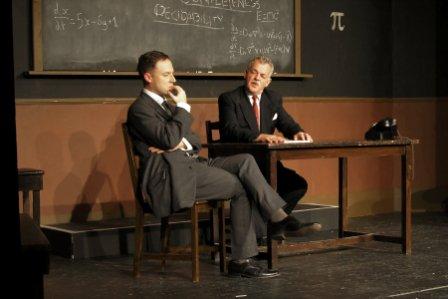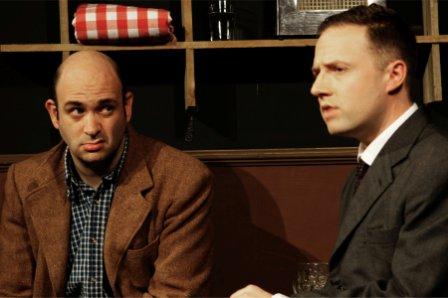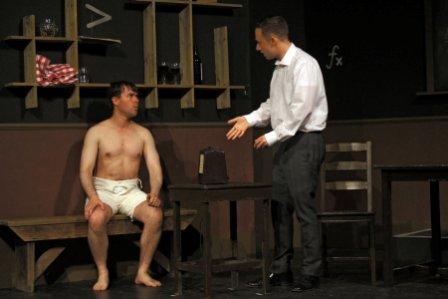|
|
||||||||||||||||||||||||||||||||||||||||||||||||||||||||||||||||||||||||||||||||
Click
here for more pictures of this play |
||||||||||||||||||||||||||||||||||||||||||||||||||||||||||||||||||||||||||||||||
|
||||||||||||||||||||||||||||||||||||||||||||||||||||||||||||||||||||||||||||||||
|
Show Report The selection committee of LADS must take great pleasure in choosing plays which are a challenge to both players and audience and this was no exception. To tackle a story which, recently, has been so well documented, about a man who made such a huge contribution to enable this country to win WW2 is no mean feat. It was very obvious to me that a lot of research had gone into both the story and the character of Alan Turing, a man who was so badly served by the establishment, so to say that Cathy Naylor struck the right note is somewhat of an understatement! Telling the story in a series of flashbacks (and forwards) at first took a bit of concentrating, especially as it is difficult to follow the programme in the darkness of the theatre, but it became easier as the play progressed and we became accustomed to the parts that other characters played at various periods in his life. Unlike other pieces that I have seen, Hugh Whitemore’s play centred on the character of Turing and his life, set outside the confines of Bletchley Park – although his work there was pivotal to the story. We learned who he was and why what happened to him, happened. And, because the outcome of the story is so well documented, there are no surprises in the ending –until you experience that final scene – when you reach a full understanding of the horror that he suffered. The arrangement of the set, designed and constructed by Garry Cooper, encompassed everything that was needed throughout the play, dispensing with scene changes and positioning. The ability to move easily from one scene to another, picking up props (ably overseen by Peter Fox) when required, removing a jacket, moving a chair, laying a table, all ensured that the audience’s attention was engaged continuously…….and strangely enough, the onstage furniture didn’t look out of place when it was not being used. The lighting design by Terry Tew, operated by Sarah Biggs, appeared simple, but allowed for various parts of the stage to be lit according to the place of the action. The sound design by Andrew Rogers, in this case the music throughout the production, was very much in keeping with the tone of the piece and, again, was ably operated by Sarah Biggs. Costumes were cleverly ambiguous throughout the action, again ensuring that the action was continuous, and was under the control of Liz Adams. Congratulations to Dolleen Howlett who, as Production Assistant, pulled all the various departments together and to the Stage Manager, Lynn Marsh, and Backstage Assistant, Karen Rogers, in ensuring that there were no technical glitches. Thanks to Howard Platt for the Production photos and the Programme and Poster Design and to Cathy Naylor for supplying such interesting information about Alan Turing himself and the background information to the story. There is always so much of interest to read in a LADS programme. There is absolutely no doubt that this whole play hinged on the character and portrayal of Alan Turing. Other people came in and out of his life, but they seemed to be there to highlight various aspects of Turing’s personality and thinking. His reaction to them reinforced the fact that he was a highly intelligent individual, a radical thinker, somewhat of an eccentric and an unashamed and unapologetic homosexual. This was all combined in a superb, well observed and totally believable performance by Dean Bartholomew. From his first appearance it was very obvious that here was no ordinary man – he may have looked conventional in his (rather crumpled) suit, but his mannerisms of nail biting and fiddling with the cuticles on his nails, his inability to look directly at people the ‘tick-like’ movements of his head and his inability to connect properly with his mother, seemed to indicate some form of autism or asperger’s syndrome. Hi speech to Sherborne School at the start of Act ll was beautifully delivered, well modulated and showed an understanding of the young boys at the school. And not once, during his whole performance, did this falter – he had become, albeit temporarily, Alan Turing. Even when he came down for his curtain call his movements were clipped. Mick Ross (Graham Milne) was the police inspector whose questioning following a robbery at Turing’s house eventually led to the uncovering of Turing’s homosexual activities and it is during these interviews and Ross’s questioning that we understand the naivety within Turing’s personality. The varying reactions to the robbery, as the facts slowly unfolded, were clearly indicated and Ross’s eventual disbelief when he realises the truth of both that and Turing’s indecent behaviour were well done – nothing over the top – even to the point of being apologetic that this has to be reported. Christopher Morcombe (Tommy Ray) was, it appeared, Turing’s first love, possibly at a time when he was discovering the different layers in his personality. He was kind, charming to Sara Turing and an obvious good friend to her son. He seemed to sense the undercurrent between the two Turings and sought to diffuse any possible difficult situation in a very gentle way. Sara Turing (Sylvia Zilesnick) showed her exasperation when Alan visited her both as a schoolboy and an adult – there seemed to be little understanding of his character in her attitude towards him, which manifested itself in her being short tempered, a bit brusque and rather detached, perhaps due to her living in India when he was at school in England. The one time she relented was when she visited him after he had been arrested when she showed a much softer side. Turing’s speech about the green foliage folding over him was, again, beautifully delivered and showed that he had no idea how his mother felt about him. A very believable character coping with a difficult situation. Ron Miller (John Gilbert) seemed to be a ‘guy on the make’, using Alan (albeit willingly) in a quite unwholesome way. He was a bit brash and really open about his past ‘relationships’, being very obviously money-motivated. There was a coarseness about him which contrasted well with Turing’s fastidiousness – thus emphasising the great differences between them. There seemed to be almost a streak of ruthlessness about him when he said he was going to leave, causing Alan to beg him to stay, a scene which I found quite upsetting. John Smith (Martin Howarth) was the other police officer who, together with Mick Ross, interviewed Turing once the accusation of gross indecency had been established. He was seen supporting Ross and conferring about Turing and what would happen to him, thus establishing the line that the law would take. Dillwyn Knox (Michael Lewkowicz) as the professor showed himself to be sympathetic to Turing and one wonders whether there was an element of understanding of his sexuality. He spoke with assurance during some quite complicated bits of dialogue and presented himself as a ‘typical’ academic. Pat Smith (Charlotte Pope) was portrayed as a woman in a knowingly hopeless situation. She was in love with Alan Turing but realises his homosexuality, is sympathetic with his relationship with his mother and with his future. She was kind and understanding, obviously intelligent, but aware of the helplessness of the situation. Finally in this excellent cast, we have Nikos (Ian Russell) a Greek who knows no English, whom Turing couldn’t understand (or be understood by) but who appeared to be the last liaison that he had. His Greek (?) speech sounded very authentic and was well delivered. ‘How can I love someone I can’t understand?’ says it all really – love has no boundaries. Congratulations to Cathy Naylor – not just for your choice of cast, but for getting from them true performances. There was nothing unreal or invented about their characters – they could almost have been people you would see on a train or meet in the street. This was human, historical drama at its best and should be applauded. The portrayal of Alan Turing helped us, the audience, to see how his life affected his ending – and in such a terribly poignant way. I truly never expected to see that final scene – a man chemically castrated and driven to the end of his endurance by the law of the country he did so much to save from defeat. It was beautifully done. Congratulations to you all.
Jacquie Stedman |
||||||||||||||||||||||||||||||||||||||||||||||||||||||||||||||||||||||||||||||||




